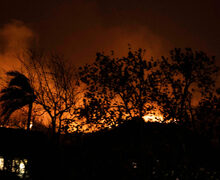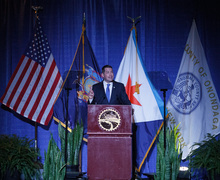Every student-filmmaker is well acquainted with uncertainty
Nora Benko | Illustration Editor
As the entertainment industry grapples with the aftermath of the pandemic and writers' strike, young student filmmakers are the most vulnerable, our columnist writes.
Get the latest Syracuse news delivered right to your inbox.
Subscribe to our newsletter here.
For the average senior who attends school for film and television production, who searches and scavenges the job market day and night, I would like to state — in simple terms — that I recognize your towering distress.
I’m in tune with you. I’m a film production major myself, a senior at the School of Visual and Performing Arts at Syracuse University. I remember touring the cage, I remember getting all my syllabus materials and I remember feeling prepared, ready to accelerate towards a fresh start in my academics.
But fatigue is the standard after four years at a university — especially considering our first two years were mostly computer-based, foreign to the bookish headspace we all circuited into our brains before the 2020 move-in.
I took those 392 days of freshman and sophomore year into account and really thought about my educational direction from a secondhand point-of-view.
As school made its way through the seasons, I was getting stressed out. But it wasn’t due to homework. It wasn’t due to the late nights writing screenplays, utilizing my brain in any way, shape, or form to create something worthwhile. I was simply exhausted, unwilling to deal with futile workloads that contributed nothing but introductory boredom.
Freshman year was a dumpster fire, and that goes for every major on this planet. I don’t need to explain much about that era, but I’ll make it quick: you sit in a technological pool of 20 others, watching a professor go through the same level of dubiety you’re in. Jobs are nowhere, connection is nowhere, just smoke and mirrors, and headaches all day.
Already, you’re missing courses which attempt to shape your future self.
The studio classes which promise “hands-on” learning experiences that your tour guides and advisors have mentioned are absent — courses that are supposed to be the catalyst for on-set experience and your gateway towards any solid employment. Sophomore year is the same story, but adds more days to your timeline.
Again, you’re with a faculty that lacks communication, not breathing the same air and not seeing eye-to-eye. The pandemic created this barrier of collaboration. With this, there was an immense lack of relationship-building that every student needs with their professor — professors who should become friends, confidants, references or recommendations. Everyone has felt the brunt of the pandemic.
This is no one’s fault, but an event that’s made an everlasting effect on every profession moving forward.
By sophomore or junior year, maybe you’re lucky enough to land a job that’s right for you. A studio of some kind, an independent goldmine or one with a more corporate background. Whatever it is, you’re really satisfied with it. The pandemic has been slowly wiped away from the film sets and production offices, and you’re ready to take on the industry from the inside.
With this comes the greatest sigh of relief; your excitement levels are back and your ambition is at an all-time high.
But once you start, a new set of challenges await you; artificial intelligence is now an unpredictable threat. The previous writers’ strike and current actors’ strike, which has been an economic and social devastation for both hard-working individuals and determined newbies, brings about a large number of vague questions. And while the newest deal has put incredible safeguards towards AI’s relationship with the writer’s room, such as a complete ban from being considered “literary material” throughout pre-production, there’s no say as to what will happen when the next deal has to be made.
Numerous fall internships were dropped and terminated. Summer internships this past year consisted of sitting in cubicles, the fluorescent light dangling over you, being told every day to “bring a book with you, because you won’t have any jobs to do.”
This past summer, I interned for a production studio in Brooklyn. Three days in we were told of the incoming actors’ strike. All 28 soundstages were desolate, and the studio lot became a ghost town. All of the set visits fell flat, and the “endless possibilities” turned into hoping for a single task to be assigned every day.
Jobs and internships have been unconditional sweet nothings. Any sort of “instructive” film program is on the fritz, especially if they continue to start their course with the phrase “at the end of the day, it’s really about who you know.”
The next couple of years will continue to feel strange. Graduation will be even stranger, entering the workforce without any beneficial grounding in practical experience. It’s a demanding time, but it isn’t the end by all means.
Michael Lieberman is a senior Film production major. He can be reached at michaelreedlieberman@gmail.com.
Published on October 8, 2023 at 11:07 pm






